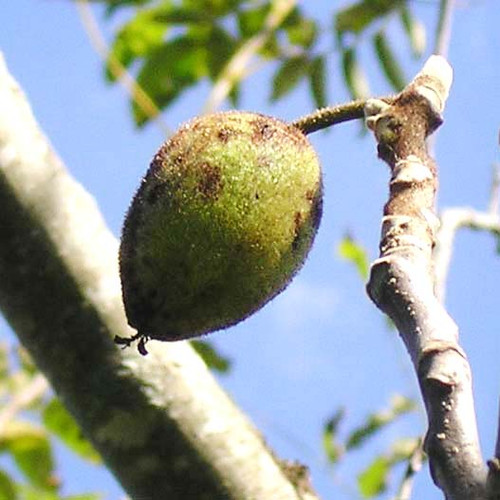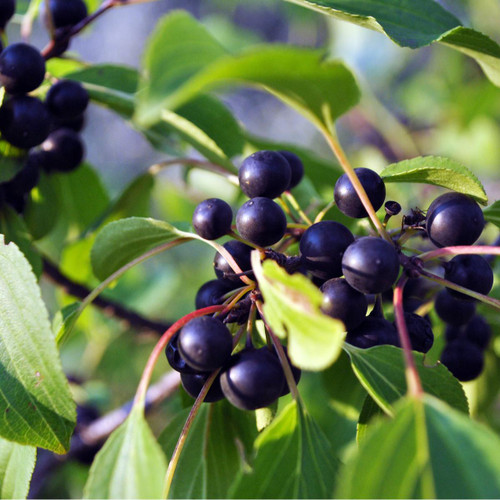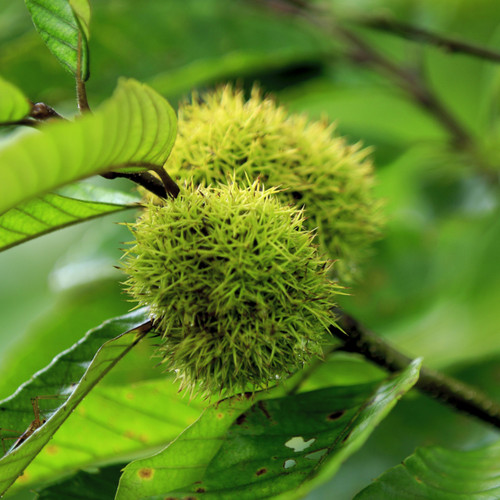Cannot Ship To:AK,AZ,CA,HI
Please Read Our Store Policies HERE Before You Order!!
Black Walnut Tree (2-3 Foot) Description
Introduction:
The Black Walnut Tree (Juglans nigra) is a large, deciduous tree known for its valuable hardwood and delicious, edible nuts. Native to North America, this tree is highly prized for both its timber and its rich-flavored nuts, which ripen in the fall. The Black Walnut Tree is a magnificent addition to large landscapes, providing shade, wildlife habitat, and a bountiful nut harvest. Its deep, dark wood is highly sought after for fine furniture and woodworking.
Plant Summary:
- Size: Grows to a height of 50-75 feet with a spread of 50-75 feet.
- Foliage: Compound leaves with 15-23 leaflets that turn yellow in the fall.
- Flowers/Fruit: Greenish-yellow catkins in spring, followed by round, green husked nuts that mature in fall.
- Growth Habit: Upright, spreading habit with a broad, rounded canopy.
- Sunlight: Prefers full sun.
- Soil: Thrives in deep, well-drained soils but tolerates a variety of soil types.
- Hardiness: Hardy in USDA Zones 4-9.
- pH Level: Prefers slightly acidic to neutral soils (pH 6.0 to 7.5).
- Pruning: Prune in late winter to remove dead or damaged branches.
- Pests/Diseases: Susceptible to walnut caterpillars and walnut anthracnose.
Pollination:
The Black Walnut Tree is monoecious, meaning it has separate male and female flowers on the same tree. It is wind-pollinated, with the male catkins releasing pollen that is carried to the female flowers. While the tree is capable of self-pollination, planting multiple trees nearby will increase nut production and improve the quality of the harvest. The nuts ripen in the fall and drop from the tree, ready for harvest.
Key Benefits:
- Produces rich-flavored walnuts that are highly nutritious and versatile in cooking and baking.
- Provides valuable, dark hardwood used in fine furniture and woodworking.
- Large, stately tree that provides shade and wildlife habitat.
- Hardy and adaptable to a wide range of growing conditions.
- Adds ornamental value with its broad, rounded canopy and yellow fall foliage.
Care Instructions:
- Light: Prefers full sun for optimal growth and nut production.
- Water: Keep soil consistently moist, especially during dry periods.
- Soil Type: Grows best in deep, well-drained soils but tolerates clay, loam, and sandy soils.
- Pollination: Wind-pollinated with male and female flowers on the same tree; planting multiple trees improves yields.
- Growth Rate: Moderate growth rate, reaching maturity in 20-25 years.
- Max Height/Width: Reaches 50-75 feet in height and spread.
- Pruning: Prune in late winter to remove deadwood and shape the tree.
Why You'll Love It:
The Black Walnut Tree is a majestic and practical addition to any large landscape, offering both beauty and utility. Its nuts are rich in flavor and highly prized for culinary use, while its wood is among the most valuable for fine furniture. Additionally, the tree provides excellent shade, making it perfect for large yards or open spaces. Its adaptability to various soil types and its hardy nature make it a reliable, long-term investment for any property.
Planting Tips:
Plant your Black Walnut Tree in early spring or fall in a sunny location with deep, well-drained soil. Dig a hole twice as wide as the root ball and plant at the same depth it was growing in the nursery. Water thoroughly after planting and mulch around the base to retain moisture and suppress weeds. Regular watering during the first few years will help establish a strong root system and promote healthy growth.
Shipping Details:
Your Black Walnut Tree will be shipped as a bare root plant, carefully packaged to ensure it arrives in optimal condition. Bare root plants are shipped during dormancy to promote successful transplanting and establishment in your landscape.
6 Reviews Hide Reviews Show Reviews
-
Black Walnut tree
Arrived in good shape. Easy to plant.
-
Black walnut tree
Great, perfect size for planting a new very young tree
-
Very happy to see the high quality of these tree stocks
These tree stocks exceeded our expectations!
-
Black walnut tree
Tree shipped when scheduled, arrived in good condition, was size specified, came with a very string amazing looking root system. Was planted the day it arrived . Can not wait for spring now to see how it does! We have high hopes for it! Will keep you posted!
-
Walnuts, June cherries, persimmon and berry
All are growing fio
-
Healthy Tree
Tree arrived dormant and well packaged. Buds look very healthy; can't wait to see what happens in the spring!










